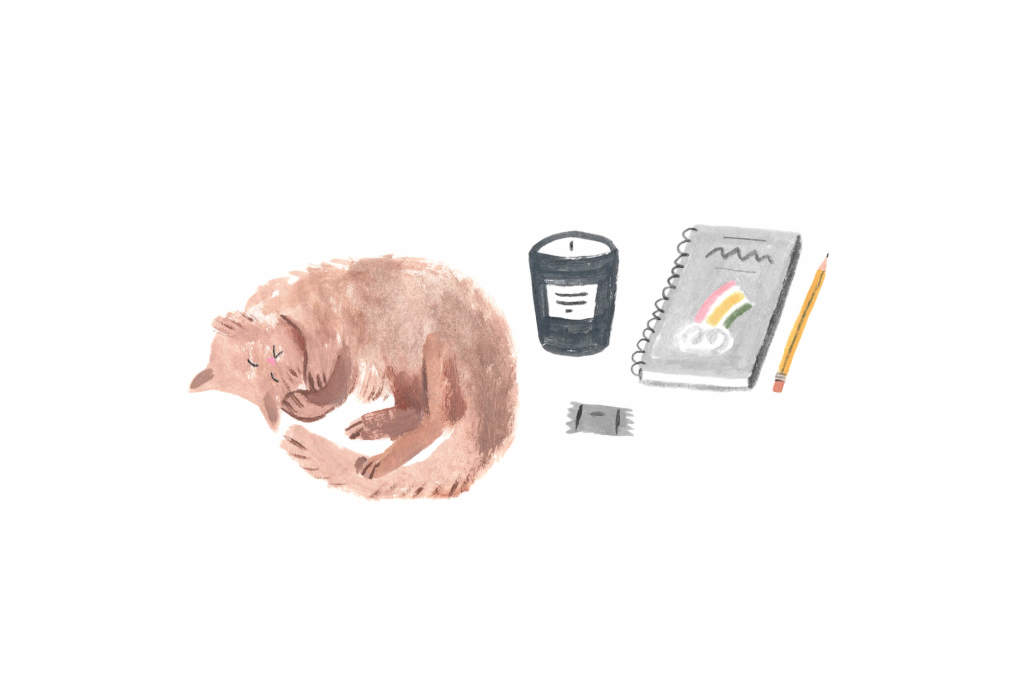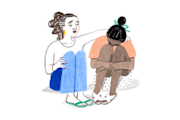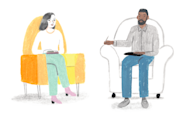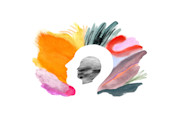Depression is one of the most common mental health disorders in the world, affecting one in five adults in the U.S. Yet, even though it is a highly treatable condition, it's estimated that half receive no treatment for their disorder.
How is depression diagnosed?
In addition to sadness, symptoms of depression may include fatigue, loss of interest in things that you once cared about, changes in appetite and/or sleep patterns, and so on.
Because the symptoms for depression are so broad, it can make it very difficult for a person to tell if they could be depressed and should seek treatment.
Depression quiz
While only a mental health professional or doctor can diagnose mental health disorders like depression, you can take our 3 minute Depression Quiz, which is based on the PHQ-9, to see what next steps you should take.
What is depression?
According to the Mayo Clinic, "Depression is more than just a bout of the blues; it isn't a weakness, and it isn't something you can't snap out of."

So how do you know if you have depressive disorder—or if you’re just temporarily unhappy?
The DSM-5, which is the de facto "rulebook" for those in the field of psychology, says one can be diagnosed with depression if they are experiencing five or more of the following symptoms in a two-week period:
Depressed mood most of the day, nearly every day.
Markedly diminished interest or pleasure in all, or almost all, activities most of the day, nearly every day.
Significant weight loss when not dieting or weight gain, or decrease or increase in appetite nearly every day.
A slowing down of thought and a reduction of physical movement (observable by others, not merely subjective feelings of restlessness or being slowed down).
Fatigue or loss of energy nearly every day.
Feelings of worthlessness or excessive or inappropriate guilt nearly every day.
Diminished ability to think or concentrate, or indecisiveness, nearly every day.
Recurrent thoughts of death, recurrent suicidal ideation without a specific plan, or a suicide attempt or a specific plan for committing suicide.
It’s important to note that one of the five symptoms a person must exhibit is a) depressed mood, or b) loss of interest or pleasure. If you’re having trouble concentrating, you could just be going through a distracted spell.
If you’re having trouble concentrating and your mood is low almost every day and you’ve gained weight and you feel exhausted and you’re feeling worthless, you start to fit the bill of someone who has depression
How common is depression?
According to the CDC’s Household Pulse Survey, a nationally representative survey administered weekly to U.S. adults, between 24% and 30% of respondents reported having depressive symptoms throughout 2020. To put this in context, in 2019, before the COVID-19 pandemic, only 6.6% reported symptoms of depression.
Another 2020 survey had similar rates, with 27.8% reporting symptoms of depression. These studies, translated to the U.S. adult population, suggest that anywhere from 59 million to 74 million experienced symptoms of depression in 2020.
What causes depression?
To put it as simply as possible: We’re not sure. You may have heard the phrase “chemical imbalance,” referring to the zillions of chemical reactions that take place in our brains at any given moment.
But to be clear: Just because your father or mother had depression doesn’t necessarily mean you will also suffer from the disease.
Or you may have been told depression “runs in the family,” referring to our genetic makeup handed down for generations. And both these things are true: Depression is affected by the chemicals in our brain, our genes (which control the chemicals in our brain), and even by traumatic life events.
But to be clear: Just because your father or mother had depression doesn’t necessarily mean you will also suffer from the disease. And just because you experience trauma, it doesn’t necessarily follow that you will have clinical depression.
Researchers have been studying the parts of the brain affected by depression for decades, and while they have made impressive progress, they still can’t definitively point to one specific cause that fits every person with depression.

Depression and public (and private) stigma
Until fairly recently, it was hard to talk about depression in public. In societies that place value on being "strong" and "independent," depression can look like weakness.[5] Adding to that is the weight leant to the phrase "mental illness." Society insidiously leads us to the conclusion that those with mental illness ="crazy" and crazy = "dangerous."
People who suffer from depression can feel this way, too! If your culture tells you that being depressed to the point of disability is a personal weakness, it’s no surprise when you start to see yourself as weak or incapable.
This is called self-stigma and actually tends to exacerbate depression and other mental illnesses by grinding self-esteem into dust and/or preventing the seeking of help due to shame.
Society insidiously leads us to the conclusion that those with mental illness = "crazy" and crazy = "dangerous."
To be clear: Having depression is not a weakness (I think few of us would call The Rock "weak") nor does it mean you are "crazy." Depression is an illness like any other physical ailment; having depression does not signal a lack of character or shortcoming of any kind.
Help is on the way
The good news is, society worldwide is changing the way it talks about, addresses, and accepts mental illness.
In 2017, the World Health Organization (WHO) issued a report that found depression was the leading cause of "ill health and disability" worldwide. Though 2017 might feel like a lifetime ago, in the grand scheme of bringing mental illness to the forefront of our health conversations, it’s as recent as if it just happened yesterday.

I think I’m depressed. What should I do?
First of all, depressive disorder is an illness one has, not a descriptor of “what” one is. You’re not “depressed,” you have depression. If you’ve read about the symptoms and they ring true to you, the first step may be to call your doctor.
After learning about what you’re going through, your doctor will likely dig further, asking:
When your symptoms started
How long they've lasted
How severe they are
If depression or other mental illnesses run in your family
If you have a history of drug or alcohol abuse
You'll also be asked if you've had similar symptoms of depression before, and if so, how long it occurred and how it was treated.
If you don’t know whether you’re ready for therapy, that’s totally fine. Just acknowledging that you feel like you might have depression is hard enough. Instead of going to a doctor, try talking things out with a trusted friend or family member.
Suggestions on how to get the conversation started include[7]:
“I’ve been getting pretty stressed lately.”
“I’m going through a tough time right now, and I think something might be wrong.”
“I think I may be depressed, have you noticed me seeming more down lately?”
Your loved one may have coping mechanisms for you to try out, or they may be able to support you in seeking professional help. Also, just talking about your struggles may help in and of itself.
Hopefully, now that more and more people are normalizing their own depression struggles society will continue to embrace depression as the very normal health condition that it is and offer support to those that are brave enough to tell their truth.
Concerned you might be depressed? Take a brief quiz
Take our free online depression quiz to determine whether you are experiencing symptoms of depression.
National Institutes of Health (U.S., & Biological Sciences Curriculum Study). (2013). Information about mental illness and the brain. Retrieved from https://www.ncbi.nlm.nih.gov/books/NBK20369/
Department of Mental Health. (2018). Depression: Medical disorder, not a weakness. Retrieved from: https://dmh.lacounty.gov/our-services/employment education/education/depression/
NAMI: National Alliance on Mental Illness. (2020). Depression. Retrieved from https://nami.org/About-Mental-Illness/Mental-Health-Conditions/Depression
American Psychiatric Association. (2013). Diagnostic and statistical manual of mental disorders (5th ed.), Washington, DC: Publisher.
Harvard Health Publishing. (2019). What causes depression? Retrieved from https://www.health.harvard.edu/mind-and-mood/what-causes-depression
Parcesepe, A. M., & Cabassa, L. J. (2012). Public stigma of mental illness in the United States: A systematic literature review. Administration and Policy in Mental Health and Mental Health Services Research, 40(5), 384–399. https://doi.org/10.1007/s10488-012-0430-z
Corrigan, P. W., & Shapiro, J. R. (2010). Measuring the impact of programs that challenge the public stigma of mental illness. Clinical Psychology Review, 30(8), 907–922. https://doi.org/10.1016/j.cpr.2010.06.004
Additional sources
NAMI: National Alliance on Mental Illness. (2017). Depression is an illness, not a weakness. Retrieved from: https://www.nami.org/Blogs/NAMI-Blog/April-2017/Depression-is-an-Illness-Not-a-Weakness
Zameena, M. (2018, April 3). The Rock reveals how he beat years of depression. CNBC. Retrieved from https://www.cnbc.com/2018/04/03/dwayne-the-rock-johnson-reveals-how-he-beat-years-of-depression.html
The Kennedy Forum Illinois. (2018, January 29th). The Kennedy Forum: Michael Phelps & David Axelrod discuss mental health. YouTube. https://www.youtube.com/watch?v=G5mJRUur_Lk&ab_channel=TheKennedyForumIllinois
Kelland, K. (2017, March 30). “Let’s talk”, WHO says, as depression rates rise 18 percent in a decade. Retrieved from https://www.reuters.com/article/us-health-depression/lets-talk-who-says-as-depression-rates-rise-18-percent-in-a-decade-idUSKBN1711BT
Fulghum, D. (2008, June 10). Symptoms of depression. WebMD. Retrieved from https://www.webmd.com/depression/guide/detecting-depression#1






